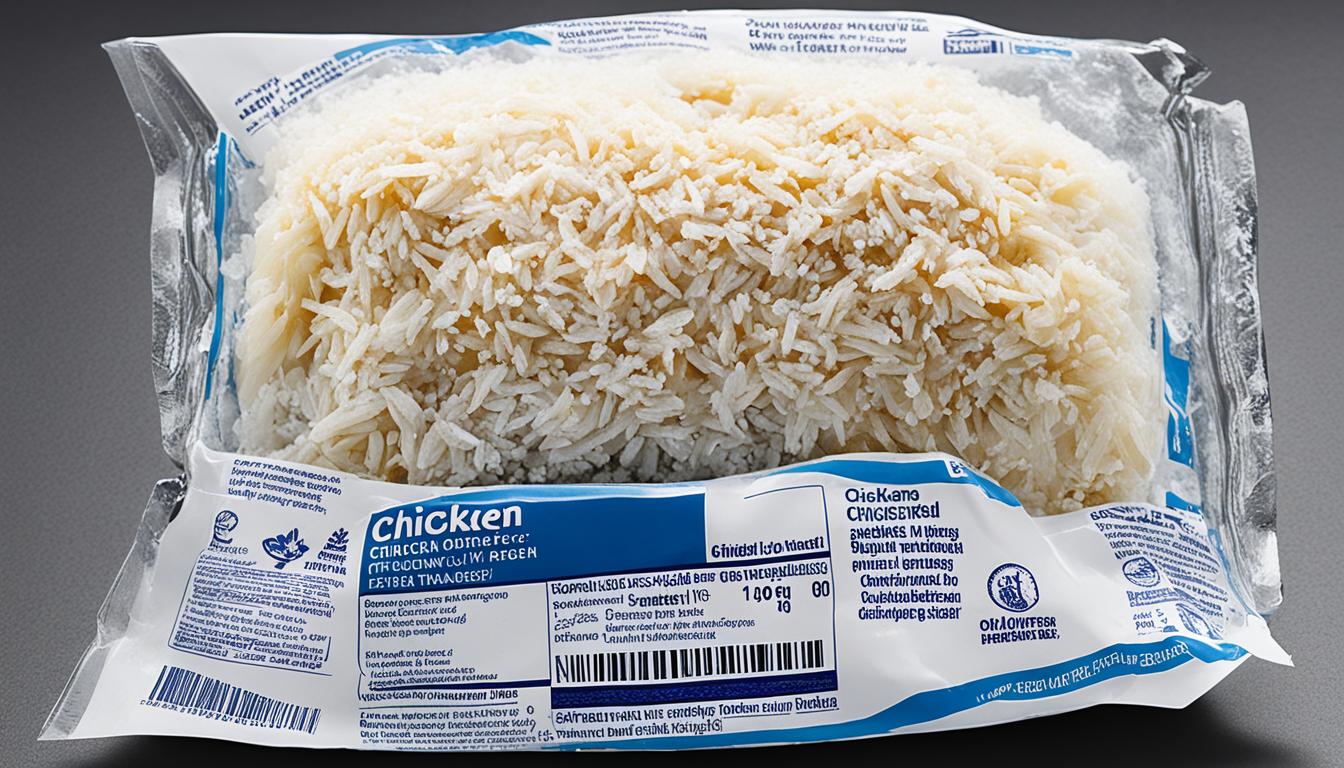Freezing chicken helps minimize food waste and fights against harmful bacteria. But, when talking about refreezing chicken, safety comes first. To keep the chicken at its best and lower illness risks, it’s crucial to know how to refreeze it safely.
Key Takeaways:
- Proper thawing methods are crucial for safe refreezing of chicken.
- Raw chicken can be refrozen within 2 days after thawing, while cooked chicken within 4 days.
- Storage guidelines and proper packaging keep refrozen chicken fresh and safe.
- Refrozen chicken stays safe forever, but taste and texture might change over time.
- Follow USDA guidelines for safe handling, cooking, and refreezing of chicken to minimize foodborne illness risks.
Guidelines for Refreezing Chicken
Freezing chicken properly is key for food safety. Freezing slows harmful bacteria but doesn’t kill them. So, it’s vital to follow refreezing chicken guidelines.
The USDA lists three thawing methods: in the fridge, cold water, and microwave. Let’s explore these methods.
1. Refrigerator Thawing
Thawing chicken in the fridge is the safest. Put frozen chicken in a container or on a tray in the fridge. It thaws slowly and safely this way.
Remember, thawing in the fridge takes time. For every 5 pounds (2.27 kg) of chicken, allow about 24 hours. You can refreeze it safely after thawing.
2. Cold Water Thawing
Need to thaw chicken fast? Use cold water. Put the chicken in a sealed plastic bag and into cold water. Change the water every 30 minutes.
You must keep an eye on it to keep the water cold. It takes 1-2 hours to thaw a pound (0.45 kg) of chicken this way. Cook it right away before refreezing.
3. Microwave Thawing
If you’re in a hurry, microwave thawing works too. Always follow your microwave’s instructions for thawing chicken. Chicken thawed this way must be cooked right before refreezing.
Be careful, as microwaving may start cooking the chicken. Watch it closely to avoid undercooking or overcooking.
Follow these tips to keep your chicken safe and high-quality for refreezing. Proper handling before refreezing is crucial to prevent foodborne illnesses.
| Thawing Method | Time Required |
|---|---|
| Refrigerator Thawing | Approximately 24 hours for every 5 pounds (2.27 kg) of chicken |
| Cold Water Thawing | About 1-2 hours for a pound (0.45 kg) of chicken |
| Microwave Thawing | Follow manufacturer’s instructions |
Safe Storage and Refreezing Tips
Refreezing chicken right can keep it safe and tasty. It’s okay to freeze chicken forever if we talk safety. But, think about how it might taste or feel after refreezing.
For the best quality, refreeze chicken quickly. Waiting too long can let bacteria grow and hurt the meat’s quality. So, try to refreeze or use chicken soon to keep it tasting great.
Don’t refreeze raw chicken if it’s been thawed for more than 2 days. The same goes for cooked chicken after 4 days. Food safety is key. Throw out chicken if it smells bad or looks spoiled.
Keep your freezer cold, at 0°F (-18°C) or lower. This stops bacteria from growing. Also, wrap your chicken well to avoid freezer burn and keep it good for longer.
Follow these tips for safe and yummy chicken even after thawing. Quick refreezing and correct storage keep the chicken’s flavor and quality.
Shelf Life and Quality of Refrozen Chicken
Handling and storing chicken right is key to keeping it good when refreezing. Whether it’s raw or cooked, knowing how long it lasts helps keep it safe and tasty. Refreeze raw chicken within 2 days after it thaws and cooked chicken within 4 days.
Refrozen raw chicken can stay good for 9-12 months, and cooked chicken for about 4 months. But, refreezing might slightly change its taste and texture. To keep it as good as possible, follow the right storage and refreezing steps.
The Shelf Life of Refrozen Chicken:
| Type of Chicken | Shelf Life |
|---|---|
| Raw Chicken | 9-12 months |
| Cooked Chicken | About 4 months |
Proper packaging is crucial when refreezing raw or cooked chicken. Use air-tight containers or freezer bags to avoid freezer burn. This keeps the chicken’s taste, texture, and color. Also, label the package with the refreeze date to remember how fresh it is.
Proper handling and storage make sure refrozen chicken stays high-quality. Stick to the recommended steps to enjoy safe and yummy chicken, even after refreezing.
Refreezing Safety Guidelines by USDA
The United States Department of Agriculture (USDA) makes sure we know how to safely refreeze poultry. It says that if food thaws in the fridge, you can freeze it again without cooking it first. So, if you thawed chicken in the fridge and decided to save it for later, you’re good to go.
But remember, refreezing chicken might lower its quality. The process can make the chicken lose moisture. This could change how your chicken tastes and feels.
“Once thawed in the refrigerator, it is safe to refreeze it without cooking.”
You can also refreeze cooked food that was thawed. If you have cooked chicken you thawed and wish to freeze again, it’s safe. Yet, handling raw and cooked chicken right is key to keeping it safe and tasty.
Always cook raw chicken to the right temperature before refreezing or eating. Harmful bacteria die if chicken is cooked to 165°F (74°C), as per USDA advice.
When dealing with leftovers, try to freeze them within 3-4 days after cooking. Leaving food out for more than 2 hours, or 1 hour in heat over 90°F, can make bacteria grow and cause illness.
With these USDA tips, you can refreeze chicken safely and enjoy it later.
Key Points:
- The USDA advises that once food is thawed in the refrigerator, it is safe to refreeze it without cooking.
- There may be a loss of quality due to the moisture lost through thawing.
- Cooked foods can also be safely refrozen if they were previously frozen.
- Handle raw and cooked foods properly and ensure they are cooked to a safe temperature.
- Leftovers should be frozen within 3-4 days and should not be left at room temperature for more than 2 hours or 1 hour in temperatures above 90°F.
Refreezing Previously Frozen Meat
Have you thought about refreezing meat that was already frozen? You can do it if it was handled right. If you got meat, poultry, or fish from the store that was frozen before, you can refreeze it safely. Just be sure to follow some guidelines to keep the meat safe and tasty.
Don’t thaw meat at room temperature, like on the counter. This can lead to bacteria growing and make you sick. It’s safer to thaw meat in the fridge or by using other methods. These include thawing in cold water or in the microwave.
The safety of refreezing meat depends on a few things. First, think about how the meat was handled before it was frozen. If it was stored right and not left out too long, it should be okay to refreeze.
Also, try to refreeze the meat quickly after it’s thawed. Doing this stops bacteria from growing and keeps you safe. Cooking the meat before you refreeze it makes it even safer.
How you cook and store the meat after refreezing matters too. Make sure you handle and cook it the right way. This includes cooking it to the right temperature to kill any bad bacteria.
In summary, if you got your meat from a good place and it was handled well, you can refreeze it. Just make sure to thaw it safely, refreeze it quickly, and cook and store it right. This way, you get the benefits of refreezing without losing quality or safety.
Key points when refreezing previously frozen meat:
- Thaw meat in the refrigerator or using safe thawing methods
- Ensure the meat was handled properly before freezing
- Refreeze the meat as soon as possible after thawing
- Cook the meat before refreezing to enhance safety
- Handle and cook the meat according to recommended guidelines
- Store the refrozen meat appropriately to maintain safety and quality
By sticking to these guidelines, you can refreeze previously frozen meat safely. This way, it stays tasty and safe from any risks.
Factors Affecting Refreezing Poultry
Deciding to refreeze poultry involves several points to consider. These include the defrosting method, if it’s raw or cooked, and the thawing duration.
Raw chicken thawed in the fridge can be refrozen within 2 days. Cooked chicken has a 4-day window for safe refreezing after thawing. These periods help keep the chicken safe and tasty when refrozen.
Handling and storing poultry right is key for refreezing. Following guidelines ensures the chicken is safe to eat and remains high quality.
Proper Handling and Storage Tips
“To keep refrozen poultry safe and high quality, proper handling and storage are key. Follow these tips:
- Always thaw poultry in the refrigerator, in cold water, or using the microwave.
- Cook raw chicken before refreezing it.
- Keep cooked chicken in the fridge up to 4 days before refreezing.
- Use air-tight packaging to avoid freezer burn.
- Make sure the freezer is at 0°F (-18°C) or lower.
Practicing these safe handling and storage methods lets you confidently refreeze poultry. This ensures it stays safe and good quality.”
Refreezing poultry is a great way to reduce food waste, but doing it right is crucial. By sticking to the right handling, storing, and refreezing practices, you can enjoy tasty, safe refrozen chicken.
| Factor | Raw Chicken | Cooked Chicken |
|---|---|---|
| Safely defrosted | Thawed in refrigerator | Thawed in refrigerator |
| Time frame for refreezing | Within 2 days after thawing | Within 4 days after thawing |
Importance of Thawing Chicken Properly
Correctly thawing chicken is key for safe refreezing. The United States Department of Agriculture (USDA) suggests specific ways to thaw. This helps avoid foodborne illnesses and keeps the quality of the chicken.
Thawing Methods
Chicken can be thawed in three USDA-recommended ways:
- Refrigerator Thawing: This is the safest method. Put the chicken on a plate or in a container, cover it, and let it thaw in the fridge. This slow process keeps the chicken at a safe temperature.
- Cold Water Thawing: For a faster method, use cold water. Put the chicken in a watertight plastic bag. Then, dip it in cold water. Change the water every 30 minutes until it’s thawed. Remember to cook it right away.
- Microwave Thawing: When in a rush, the microwave can help. Use the defrost setting or 50% power, following the maker’s guide. Be careful as it may start cooking the outside of the chicken, causing uneven cooking.
Don’t thaw chicken at room temperature as it can grow bacteria quickly, raising illness risks.
Always use proper thawing techniques for the safety and quality of refrozen chicken.
Following the USDA’s thawing tips lessens foodborne illness risks. This lets you safely enjoy refrozen chicken and your favorite poultry meals.
Best Practices for Refreezing Chicken
To keep chicken good after refreezing, it’s all about how you do it. Freezing it slowly can make it tough and dry because of big ice crystals. So, refreeze it quickly after it thaws to avoid this.
Putting the chicken in a shallow container helps it freeze quickly and evenly. This stops big ice crystals from forming. Also, make sure it’s in air-tight packaging. This keeps away freezer burn, which can ruin the chicken’s taste, texture, and color.
By doing these things, you make sure your refrozen chicken stays tasty, safe, and high quality for your next meal.
Quick Tips for Refreezing Chicken:
- Refreeze chicken as soon as possible after thawing to maintain optimal quality.
- Use a shallow container for faster and more even freezing.
- Ensure the packaging is air-tight to prevent freezer burn.
Chicken Storage Guidelines
Keeping chicken fresh and safe is crucial. It is important whether the chicken is raw or if it’s leftovers. By following the USDA’s chicken storage rules, you can enjoy your chicken. You’ll avoid quality loss and foodborne illnesses too.
Refrigerating Chicken
Keep raw chicken in the fridge for up to 2 days. Within these 2 days, you can cook it or freeze it again for later. For cooked chicken, it’s good in the fridge for 3 to 4 days. Always use airtight containers to keep it fresh and safe.
Refreezing Raw Chicken
If your raw chicken was thawed in the fridge but you’re not cooking it right away, it’s okay to freeze again. But remember, safety first. Don’t refreeze if you thawed it using cold water or a microwave. Fridge thawing is slow and safe, keeping bacteria away.
Proper Handling and Storage
Whether it’s raw or cooked, how you store chicken in the fridge matters. Here are tips to keep in mind:
- Keep raw chicken separate from other foods to avoid cross-contamination.
- Store raw chicken on the bottom shelf of the refrigerator to prevent any drips from contaminating other foods.
- Label containers with the date of storage to ensure you use them within the recommended timeframes.
- Regularly clean and sanitize your refrigerator to prevent the accumulation of bacteria.
Visual Guide: Chicken Storage Guidelines
| Chicken Type | Refrigerator Shelf Life | Freezing Timeframe |
|---|---|---|
| Raw Chicken | Up to 2 days | Safely refreeze raw chicken within 2 days after thawing in the refrigerator. |
| Cooked Chicken | 3-4 days | Safely refreeze cooked chicken within 4 days after refrigeration. |
Proper storage and handling are key to maintaining the freshness and safety of chicken.
The Bottom Line on Refreezing Chicken
Understanding how to safely refreeze chicken is key. Consider how you thaw it, if it’s raw or cooked, and thawing time.
Refreeze raw chicken in 2 days and cooked chicken in 4 days after thawing. Following these timelines ensures safety and quality.
Chicken can stay safe in the freezer for a long time. Yet, taste and texture might change. Sticking to storage and refreezing rules helps keep your chicken good.
Handling chicken safely is a must to stop bad bacteria and food illnesses. With careful storage and handling, refrozen chicken can be both tasty and safe.
| Raw Chicken | Cooked Chicken |
|---|---|
| Can be safely refrozen within 2 days after thawing | Can be safely refrozen within 4 days after thawing |
| Refrozen chicken can remain safe in the freezer indefinitely | Refrozen chicken can remain safe in the freezer indefinitely |
| May experience changes in taste and texture | May experience changes in taste and texture |
| Follow proper storage and refreezing guidelines | Follow proper storage and refreezing guidelines |
Conclusion
Refreezing chicken safely requires following the right steps. Make sure you handle thawing, storage, and refreezing properly. This helps prevent foodborne illnesses and keeps the chicken quality high.
Safe handling and storing of chicken is crucial. Use safe methods to thaw chicken, like in the fridge, with cold water, or in the microwave. Always cook chicken to the right temperature before you refreeze it.
Stick to these guidelines for refreezing poultry to ensure your chicken remains tasty and safe. Feel free to refreeze cooked or raw chicken in the suggested timeframe. This way, you can enjoy your poultry without wasting food.





